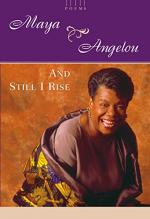|
This section contains 371 words (approx. 1 page at 400 words per page) |

|
Still I Rise Summary & Study Guide Description
Still I Rise Summary & Study Guide includes comprehensive information and analysis to help you understand the book. This study guide contains the following sections:
This detailed literature summary also contains Quotes and a Free Quiz on Still I Rise by Maya Angelou.
The version of this poem used to create this study guide appears in: Angelou, Maya. The Complete Poems of Maya Angelou. Random House, 1994.
Note that parenthetical citations within the guide refer to the lines of the poem from which the quotations are taken.
“Still I Rise” is a 43-line poem composed of seven quatrains and two end stanzas written by Maya Angelou. The poem was published in 1978 as part of Angelou’s third body of work, And Still I Rise. “Still I Rise” is the inaugural poem to the third part of And Still I Rise. In Part One, Touch Me, Life, Not Softly, Angelou presents the ways that life has touched her while exploring both the complexities of love and the strength of women in the face of abuse. In Part Two, Traveling, Angelou takes the reader through the American South, revealing the conditions in which she was raised, looking at issues such as drug addiction, child abuse, kinship, and the conditions of the underserved African-Americans in the South and the inner city. In Part Three, And Still I Rise, Angelou reflects the theme of strength found in Part One, emphasizing that despite everything she has been through, she will rise and persevere. “Still I Rise” has served as a mantra for many because of the universal appeal of its theme.
“Still I Rise” begins with the speaker confronting an unnamed antagonist for the wrongs they have done to them. In the opening lines of the poem, the speaker reveals the nature of their antagonist and highlights some of the injustices that their antagonist may aim towards them. Some of these deeds included misrepresenting who the speaker really was as well as physical acts of violence aimed at the speaker: "You may write me down in history / With your bitter, twisted lies / You may trod me in the very dirt" (1-3). However, despite this adversity, the speaker from the onset of the poem is confident of their strength and ability to overcome any obstacle. This theme persists throughout the poem. Despite every attempt to silence, restrict, and erase the speaker, she remains, with each passing stanza strengthening, echoing, and amplifying the speaker’s words and message.
Read more from the Study Guide
|
This section contains 371 words (approx. 1 page at 400 words per page) |

|



